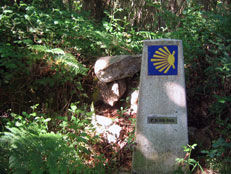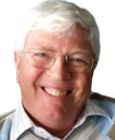It might seem crazy for an overweight, cigarette-smoking, middle-aged man with dodgy ankles and a large white beard like Father Christmas to take his 9-year-old son and set off on foot for 500 miles across northern Spain, following El Camino to Santiago de Compostella, during the height of summer. But this is exactly what Michael Shearer did several years ago. Now he has published an amazing and rather wonderful account of the expedition in his book Walking a Rainbow.
As you might expect, the pair experienced significant hardship along the way, suffering all manner of ills and misfortune, but somehow they made it; even going a little further, to 'Finisterre' (Land's End) on the Spanish coast for a final moment of glory.
Shearer portrays himself as a somewhat disorganised, almost bumbling university teacher of philosophy, a married man with a comically strong fantasy sex-life, a man who, at the outset, is not particularly religious and not expecting much in the way of spiritual experience or uplift during the several weeks he knows the journey will take. Many would criticize his parenting skills too, encouraging his very young son to smoke and drink alcohol freely, and giving him a bold degree of independence such that he loses him worryingly twice by day's end on the journey, and almost a third time to exhaustion and ill-health. The boy 'Kes', though at times a pathetically lost figure overwhelmed by the circumstances, comes across from the outset as astonishingly insightful and mature, devoted to his father, straight-talking and frequently very funny. Perhaps his father's approach, of treating him at all times like an adult, made some sense after all. I particularly enjoyed the passage in which he recounts the fable of Oedipus, encouraging Kes to respond as the story unfolds.
Naturally, there are some grim passages. The pilgrim hostels in which they were obliged to sleep were frequently unpleasant. For example: "The refuge was a two-storied, disused school-house, originally whitewashed, but so many patches had flaked away that it looked like mould on rotting flesh. It was in a state of advanced decay. It wasn't so much falling down as decomposing." (page 222)
They also met some strange and often curiously hostile people along the way. Nevertheless, whenever in apparently dire straits, something or someone came along to rescue them; for every downturn in fortune, it appears they received in return some kind of blessing. Some of their travelling companions; particularly the knowledgeable and experienced astrologer-philosopher Claudio, and the beautiful soul-mate figure Marta; proved to be remarkably positive fellow-pilgrims for both Shearer and Kes.

In the book's title, the author gives us a strong hint of the magical and poetic nature of their adventure. One form of spiritual experience commonly reported is ‘An awareness of a sacred presence in nature’. Here is a passage from Shearer, that describes something like this occurring to him on a steep path in the Spanish mountains: "We were above it all, liberated into a massive space. It was exhilarating... We walked in a state of exuberance. It was heady and magical. I felt like singing. Energy gushed up through me like a spiritual oil well. It was special here... The sense of euphoria grew and grew. It took over until I was just one glorious bubble of bliss... My self had opened and opened & in had flowed the energy of the mountains & the sky. I was ecstatic." (pages 250-1)
Another common type of spiritual experience is ‘An awareness of a patterning of events’. Shearer says early in the book that this kind of synchronicity or meaningful coincidence, "Is not a weird rarity, it is common and frequent... The trip was riddled with such events". (page 10) This is the kind of experience that encourages people to speak in terms of 'fate', 'destiny', 'Providence', 'karma', and also 'God's will'. How often do we hear people, whether they acknowledge a spiritual dimension or not, say of something that, 'It was meant to be', or, perhaps by way of consoling themselves and others, 'It was just not meant to be'?
This may not simply be an example of so-called 'superstition' at odds with the findings of science and therefore to be dismissed. Shearer admits that synchronicity is not yet a scientifically documented phenomenon, "But if it happens", he says, "Then physics is somehow radically misconceived. If things can happen which are not just effects of physical causes, but have meaning for those who experience them, and happen because of the meaning, then the world works in a way which includes meaning and metaphor. The world is a poetic place." (page 36)
This is one example of a number of thought-provoking observations and ideas to be found throughout this remarkable book, which succeeds in being both educational and highly entertaining. I'm looking forward to reading through it again.
Copyright Larry Culliford
You can also hear his interview with Daniela Norris about his books and ideas here. (25 min).
Watch Larry on YouTube in three short videos on psychology and spirituality.


